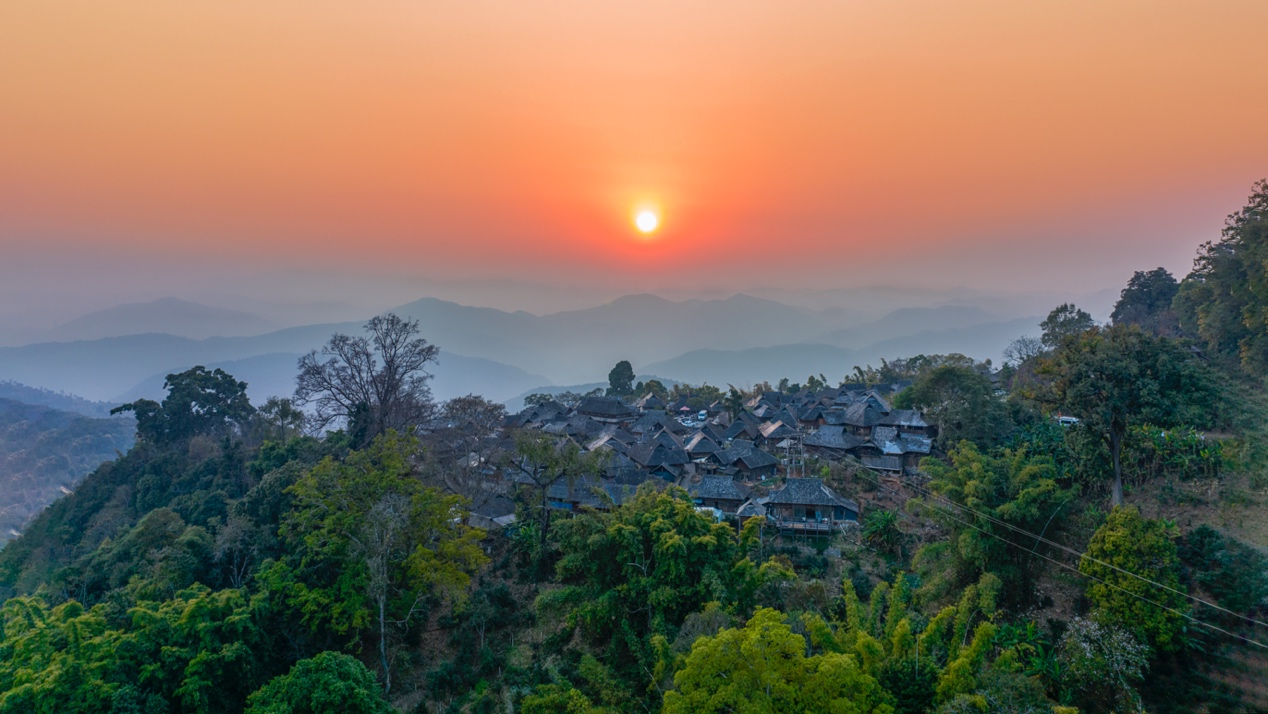
An ancient village on the Jingmai Mountain is surrounded by forests and old tea plantations. /Courtesy of Duan Zhaoshun
An ancient village on the Jingmai Mountain is surrounded by forests and old tea plantations. /Courtesy of Duan Zhaoshun
The Cultural Landscape of Old Tea Forests on the Jingmai Mountain in Pu'er, southwest China's Yunnan Province, was inscribed on the UNESCO World Cultural Heritage list on Sunday, bringing the total number of the country's UNESCO World Heritage sites to 57.
The nomination was approved during the 45th session of UNESCO's World Heritage Committee underway in Riyadh, capital of Saudi Arabia, which aims to update the United Nations' prestigious heritage list.
A long history of tea cultivation
The heritage site consists of five old tea forests covering an area of 1,180 hectares, nine ancient villages with a population of about 5,000 and three protective partition forests.
Some 1,000 years ago, the ancestors of the Blang ethnic group migrated to the Jingmai Mountain, where they began domesticating wild tea trees.
The landscape well integrates vast tea plantations, ancient villages and diverse ethnic cultures. It's considered a typical example of harmonious coexistence between humans and nature, which also shows local people's wisdom to know, respect and make use of nature.
The tea trees have been cultivated in dense natural forests. The planting method has helped prevent pests and diseases, promote pollination and provide natural nutrients to the trees, thus continuously producing high-quality organic tea.
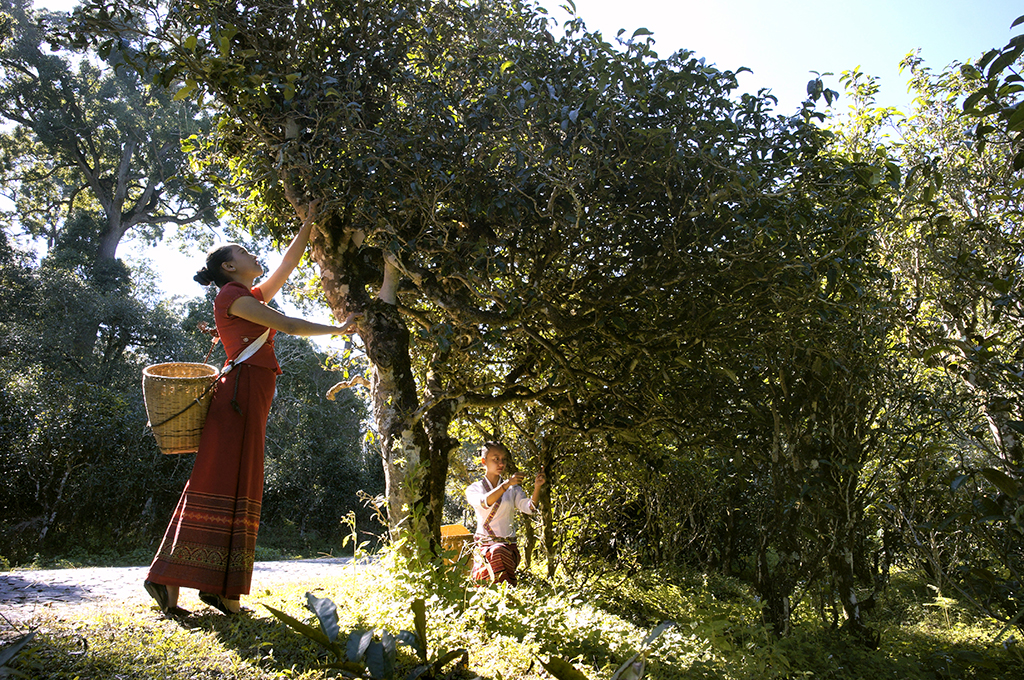
Local villagers at the Jingmai Mountain pick tea leaves./Courtesy of Zhao Ting
Local villagers at the Jingmai Mountain pick tea leaves./Courtesy of Zhao Ting
"Our place still keeps a complete ecosystem integrating mountain, water, forests, tea trees, many other plants and various species of animals and insects. It's precious given the fact that many parts of the world are faced with serious ecological losses," said Su Guowen, a local villager of the Blang ethnic group.
The 77-year-old told CGTN that they have never applied any fertilizers and pesticides to the old tea plantations.
Tea has played a vital role in local people's life throughout the centuries. According to Su, a highly-respected member of the Blang community, tea leaves were initially used for its medicinal properties. He said that their ancestors encountered serious plagues during migration and it's the tea leaves that had saved them from danger. And then, the leaves gradually became a food source.
"Later on, tea was regarded as a special gift and offered as tribute to honor our ancestors," said Su. "Over time, we began using it to trade for farming tools and basic necessities, such as clothing, footwear, sugar and salt. This is why we say everything we possess is thanks to tea."
Today, tea is a popular product that generates substantial income for local people.
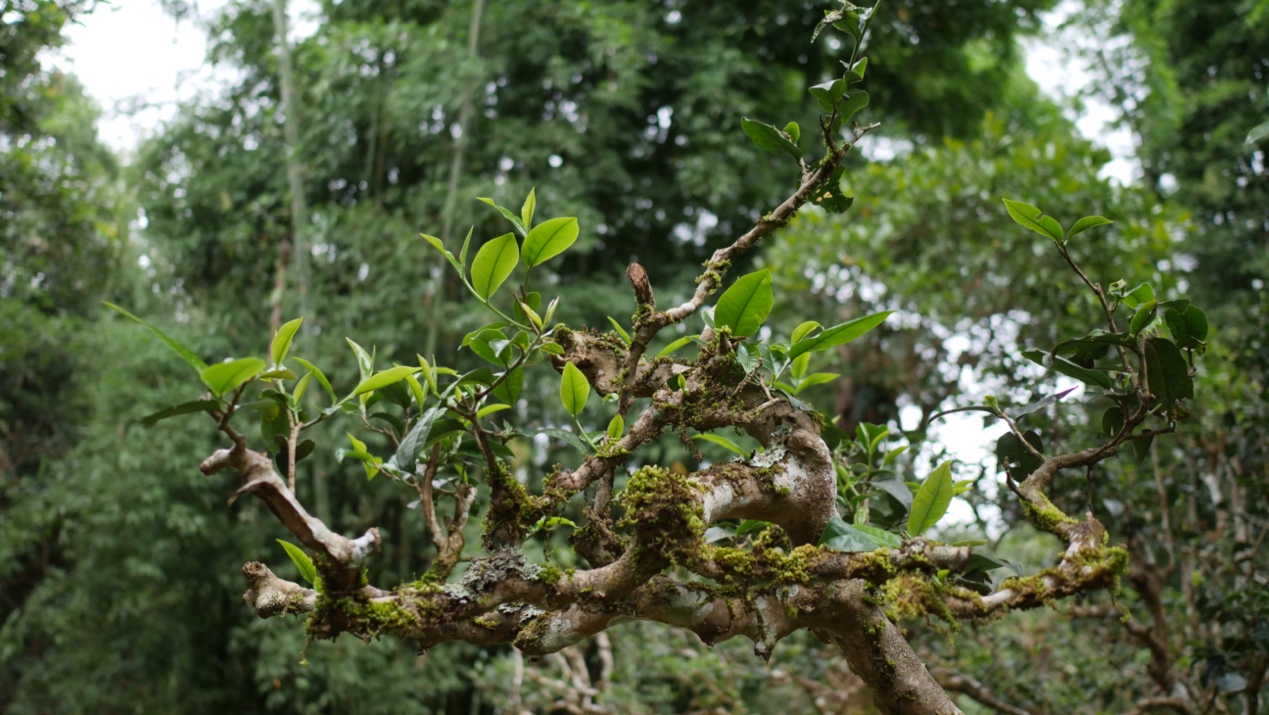
A old tea tree grows in a natural forest on the Jingmai Mountain. / Courtesy of Ou Bafei
A old tea tree grows in a natural forest on the Jingmai Mountain. / Courtesy of Ou Bafei
In the vicinity of the tea plantations are some 10 villages inhabited by various ethnic groups, including the Blang, Dai, Wa, and Hani communities. Most of the residential houses still retain the traditional two-storied pile-dwelling style. Symbols of tea are often featured on the roofs.
In the past, the ground floor was usually used to keep livestock. Today, the space is often transformed into a tearoom.
"We have undergone significant changes. In the past, there were no interior decorations, and we lacked essential facilities like restrooms. Now, we have all these amenities," said Er Bing, a local villager.
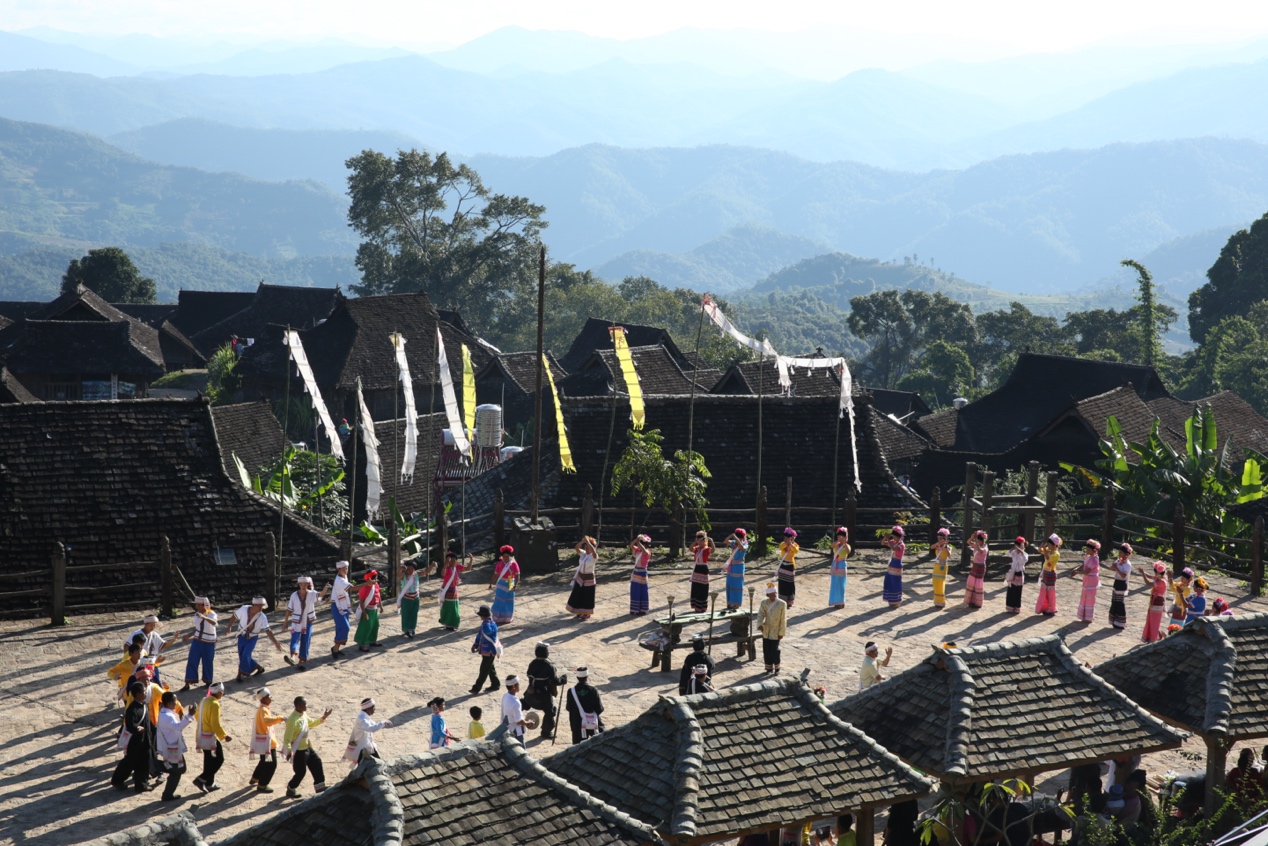
Local villagers at the Jingmai Mountain celebrate a traditional festival. /Courtesy of Tan Chun
Local villagers at the Jingmai Mountain celebrate a traditional festival. /Courtesy of Tan Chun
Profound tea-centered culture
Over the years, a story has been going round local villagers, which says that Pa Aileng, headman of the Blang community, urged the villagers to carefully protect the tea plantations as his dying wish.
"If I leave you with livestock, they may not survive natural disasters. If I leave you with money and treasure, you will run out of them one day. So I will leave you with these fertile tea plantations, which will be sustainable and inexhaustable," Su quoted the ancestor as saying, adding that the headman told the younger generations to protect the tea trees like they protect their eyes.
Over time, the tea culture has also been carefully preserved and handed down through generations.
In mid-April each year, a grand festival is held by Blang people to honor their "tea ancestor" Pa Aileng.
In every tea plantation, an ancient tree is selected as the "tree of tea spirit." Each spring, local residents hold a special ritual to worship these respected trees.
"We want to let the trees know that we will be picking the tea leaves and showing our gratitude to them. Through this ritual, we also pray for a bountiful harvest," said San Wen, a local villager.
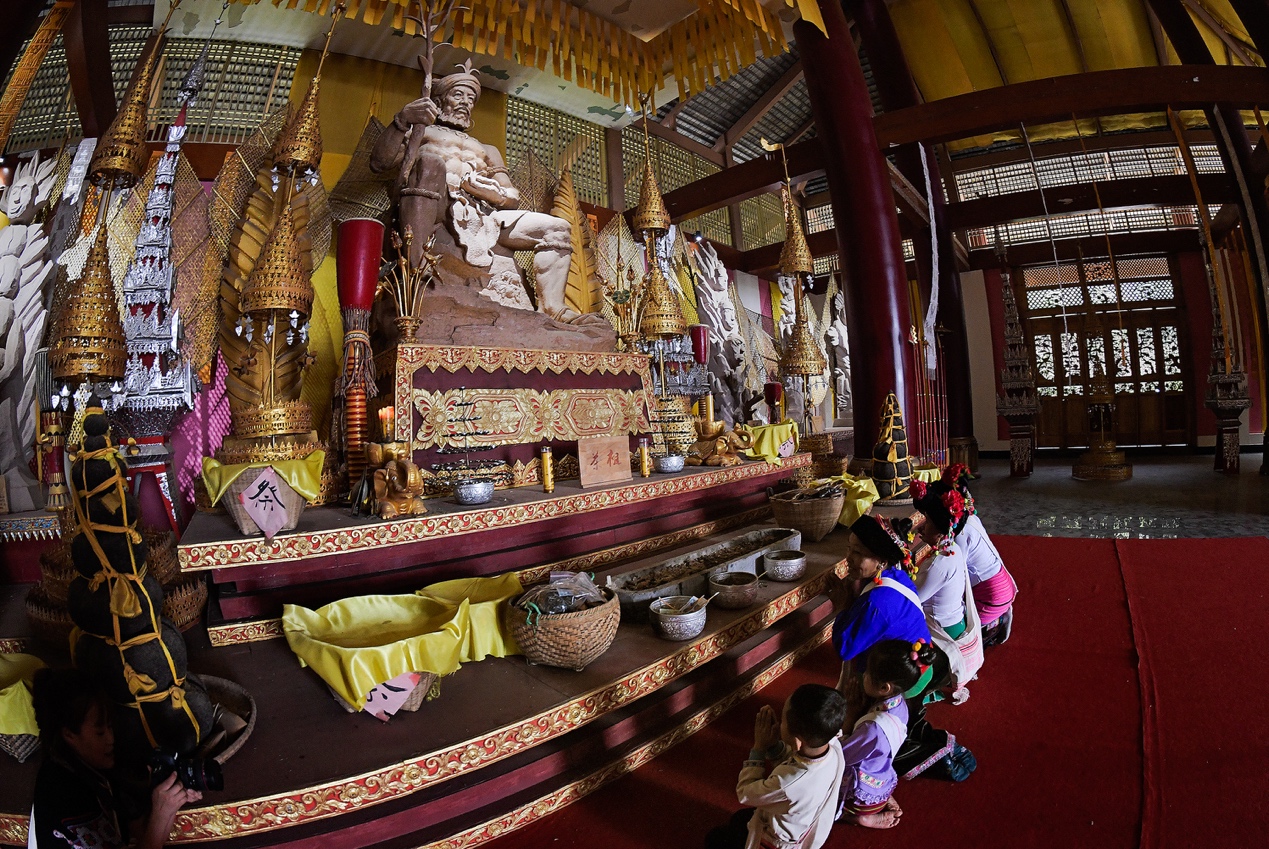
Local villagers pay tribute to their "tea ancestor." /Courtesy of Zhu Yunkuan
Local villagers pay tribute to their "tea ancestor." /Courtesy of Zhu Yunkuan
In recent years, Su has dedicated himself to reviving some threatened traditions. For example, he spent quite some time teaching the scriptures of the Buddhism that Blang people believe in.
"From the scriptures, we know that humans can't destroy nature and have to pursue harmonious coexistence with it for a sustainable development. It's an important cultural concept," said Su.
"The scriptures also tell us that we have to be kind and moral people and try to do some good to the society, to other people," he added.
Today, it's widely accepted by locals that they should pass on their centuries-old traditions and culture.
Ma Zhimin, who hails from Beijing, married a local woman. The family of three once spent a few years living in Beijing but are now settled on the Jingmai Mountain.
"My daughter's competence in speaking Blang language was gradually degrading while in Beijing and she didn't feel like communicating with my wife in this language. When we noticed this, we thought it's a serious issue. She is supposed to master the language of her ethnic group, so we quit our jobs there and moved back," Ma told CGTN.
New development opportunities
According to local government, about 90 percent of residents on the Jingmai Mountain are engaged in the tea industry, and at least 75 percent of their income is from tea.
In the past decade, the industry here has experienced rapid growth. Shai Kan from the old village of Wengji says that for quite a long time, the place had remained relatively obscure, with locals mainly selling fresh leaves or simply processed tea to merchants at a very low price.
However, in recent years, with the improvement of related infrastructure, entrepreneurs and tourists have flocked to the region, boosting the tea's popularity.
"Two years ago, the annual per capita income was about 15,000 yuan (around $2,062), and it's expected to reach 25,000 yuan (some $3,436) this year, as visitors return following the lifting of travel restrictions," said Shai.
Official data shows that the price of the most valuable tea from Jingmai Mountain has risen from 500 yuan ($69) per kilo in 2010 to its current range of 800 to 1,200 yuan ($110 to $165).
Shai Kan now runs a factory and has established his own brand, which is a new business trend here.
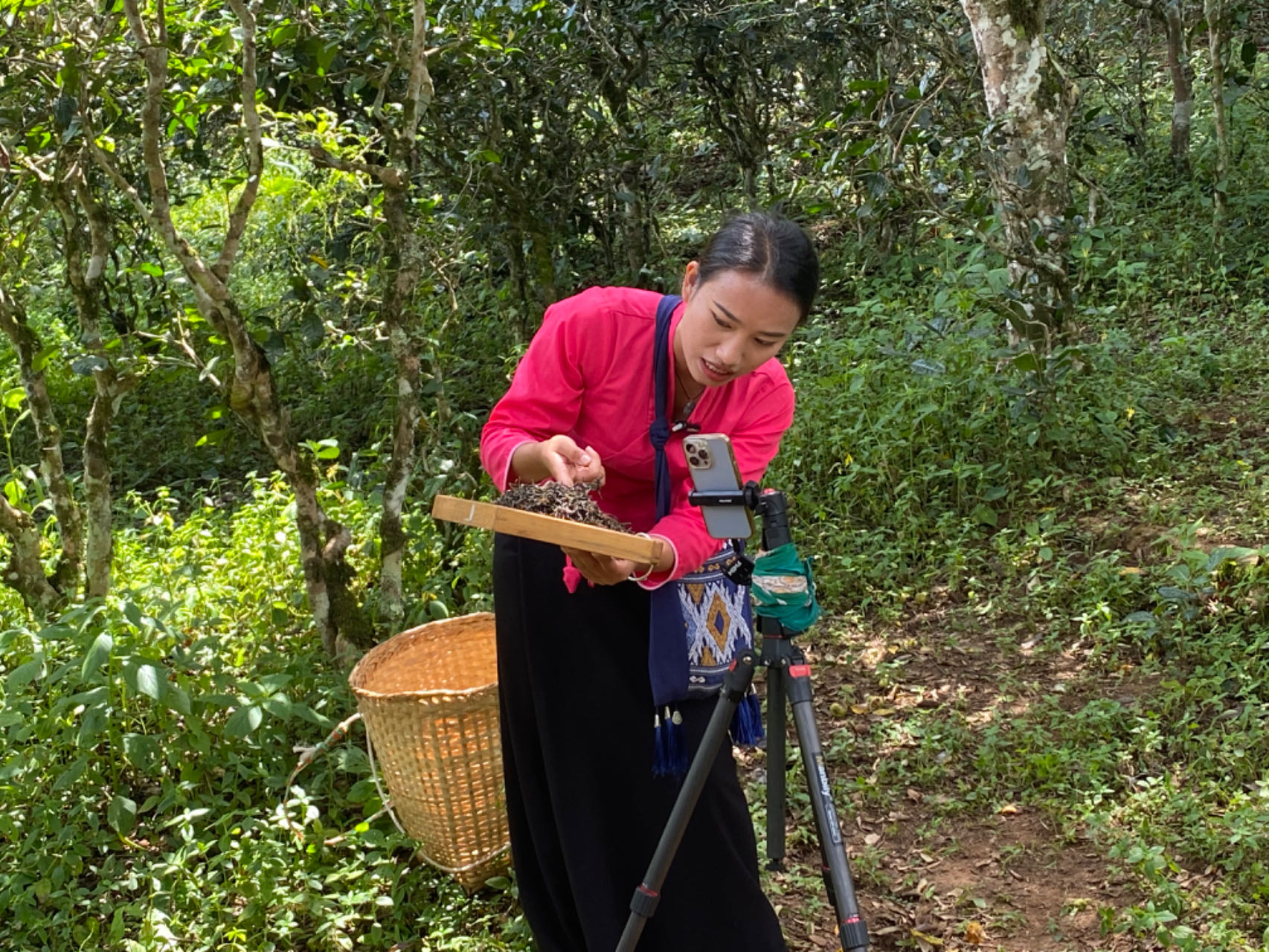
A woman of Dai ethnic group promotes tea via live-streaming platform. Luo Caiwen/CGTN
A woman of Dai ethnic group promotes tea via live-streaming platform. Luo Caiwen/CGTN
Another notable change is the transformation of marketing and sales strategies. Nowadays, some young people utilize live-streaming platforms, a popular sales method in China, to promote their products.
"It works well. I started to do this in October last year. On average, I am able to sell products worth 5,000 to 6,000 yuan ($687 to $825) per session, and sometimes, up to tens of thousand yuan," said Xian Jin, a villager of Dai ethnic group.
The influx of visitors is also boosting tourism to this once isolated mountain area.
Ma Zhimin and his wife Yu Ni now run a guesthouse. Here, guests can experience local tea culture by picking tea leaves and learn how to process tea.
"This place is, first and foremost, me and my wife's home, and then it becomes a home for our guests. Once Jingmai Mountain joins the world heritage list, our guesthouse will be a part of a world heritage site," said Ma. "Our slogan: 'your home in a distant place'."
Now that their hometown has become a World Heritage site, many villagers expect better development.
"Looking into the future, we should prioritize education to improve our people's quality. Then, we need to better promote our ethnic culture to strengthen the villagers' understanding and sense of identity with it," said Su.
The 77-year-old stressed that local people should also stick to the concept of protection while seeking development, as the ancient tea trees are irreplaceable.